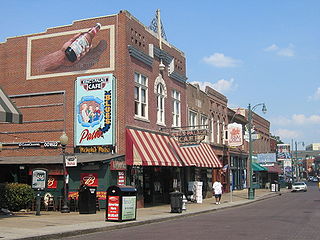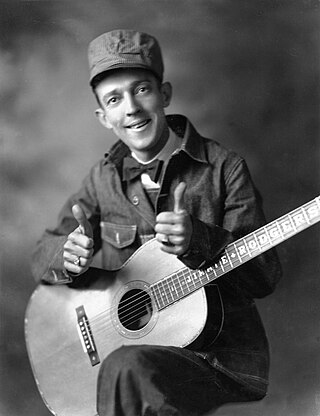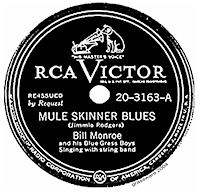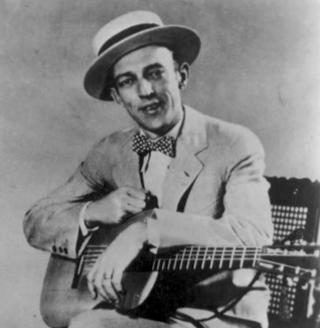
Sun Records is an American independent record label founded by producer Sam Phillips in Memphis, Tennessee on February 1, 1952. Sun was the first label to record Elvis Presley, Charlie Rich, Roy Orbison, Jerry Lee Lewis, Carl Perkins, and Johnny Cash. Prior to that, Sun had concentrated mainly on African-American musicians because Phillips loved rhythm and blues and wanted to bring it to a white audience.

Carl Lee Perkins was an American guitarist, singer and songwriter. A rockabilly great and pioneer of rock and roll, he began his recording career at the Sun Studio, in Memphis, beginning in 1954. Among his best-known songs are "Blue Suede Shoes", "Honey Don't", "Matchbox" and "Everybody's Trying to Be My Baby".

Clarence Eugene "Hank" Snow was a Canadian-American country music artist. Most popular in the 1950s, he had a career that spanned more than 50 years. He recorded 140 albums and charted more than 85 singles on the Billboard country charts from 1950 until 1980. His number-one hits include the self-penned songs "I'm Moving On", "The Golden Rocket", and "The Rhumba Boogie"; and famous versions of "I Don't Hurt Anymore", "Let Me Go, Lover!", "I've Been Everywhere", "Hello Love", as well as other top 10 hits.
The story of Tennessee's contribution to American music is essentially the story of three cities: Nashville, Memphis, and Bristol. While Nashville is most famous for its status as the long-time capital of country music, Bristol is recognized as the "Birthplace of Country Music". Memphis musicians have had an enormous influence on blues, early rock and roll, R&B, and soul music, as well as an increasing presence in rap.

Yodeling is a form of singing which involves repeated and rapid changes of pitch between the low-pitch chest register and the high-pitch head register or falsetto. The English word yodel is derived from the German word jodeln, meaning "to utter the syllable jo". This vocal technique is used in many cultures worldwide. Recent scientific research concerning yodeling and non-Western cultures has shown that music and speech evolved from a common prosodic precursor.

Beale Street is a street in Downtown Memphis, Tennessee, which runs from the Mississippi River to East Street, a distance of approximately 1.8 miles (2.9 km). It is a significant location in the city's history, as well as in the history of blues music. Today, the blues clubs and restaurants that line Beale Street are major tourist attractions in Memphis. Festivals and outdoor concerts frequently bring large crowds to the street and its surrounding areas.

James Charles Rodgers was an American singer-songwriter and musician who rose to popularity in the late 1920s. Widely regarded as "the Father of Country Music", he is best known for his distinctive rhythmic yodeling, unusual for a music star of his era. Rodgers rose to prominence based upon his recordings, among country music's earliest, rather than concert performances.

Sun Studio is a recording studio opened by rock-and-roll pioneer Sam Phillips at 706 Union Avenue in Memphis, Tennessee, on January 3, 1950. It was originally called Memphis Recording Service, sharing the same building with the Sun Records label business. Sun Studio is perhaps most famous for its role in the early years of Elvis Presley’s career.

Same Train, A Different Time is the ninth studio album by American country music artist Merle Haggard backed by The Strangers, released in 1969, featuring covers of songs by legendary country music songwriter Jimmie Rodgers. It was originally released as a 2 LP set on Capitol (SWBB-223).

"Blue Yodel no. 8, Mule Skinner Blues" is a classic country song written by Jimmie Rodgers. The song was first recorded by Rodgers in 1930 and has been recorded by many artists since then, acquiring the de facto title "Mule Skinner Blues" after Rodgers named it "Blue Yodel #8".
"In the Jailhouse Now" is an American novelty blues song originally found in vaudeville performances from the early 20th century, usually credited to Jimmie Rodgers. The song's first two verses trace the exploits of Ramblin’ Bob, who cheats at cards and gets caught, while the final verse tells about taking a girl named Susie out on the town and winding up in jail together.
The blue yodel songs are a series of thirteen songs written and recorded by Jimmie Rodgers during the period from 1927 to his death in May 1933. The songs were based on the 12-bar blues format and featured Rodgers’ trademark yodel refrains. The lyrics often had a risqué quality with "a macho, slightly dangerous undertone." The original 78 issue of "Blue Yodel No. 1 " sold more than a half million copies, a phenomenal number at the time. The term "blue yodel" is also sometimes used to differentiate the earlier Austrian yodeling from the American form of yodeling introduced by Rodgers.
The first season of the Theme Time Radio Hour, hosted by Bob Dylan, ran from May 3, 2006, to April 18, 2007 on XM Satellite Radio for a total of 50 shows.

"Blue Yodel No. 1 " is a song by American singer-songwriter Jimmie Rodgers. The recording was produced by Ralph Peer, who had originally recorded with Rodgers during the Bristol Sessions. It was released by the Victor Talking Machine Company on February 3, 1928. Rodgers recorded it during his second session with Victor, on November 30, 1927.
The Mojo Triangle, a geographical and cultural area located within a triangular connection between New Orleans, Nashville and Memphis, is the birthplace of country, blues, jazz, and rock and roll. The Mojo Triangle has creative artists, not just in music, but also in literature and films.

Emilie Sunshine Hamilton, known professionally as EmiSunshine, is an American singer-songwriter from Madisonville, Tennessee, and a social media personality. Her performance of Jimmie Rodgers' "Blue Yodel No. 6" was posted on YouTube in 2014 and received over 1 million views and attention from the Today show (NBC) and Music Row. Her YouTube series, Americana Corner, featured Holly Williams for its debut episode and earned a feature story in Rolling Stone's country section.

"Waiting for a Train" is a song written and recorded by Jimmie Rodgers and released by the Victor Talking Machine Company as the flipside of "Blue Yodel No. 4" in February 1929. The song originated in the nineteenth century in England. It later appeared in several song books, with variations on the lyrics throughout the years.

The discography of Jimmie Rodgers is composed of 111 songs that spanned the blues, jazz and country music genres. His first recording was made on August 4, 1927, during the Bristol sessions. The sessions were organized by Ralph Peer, who became Rodgers' main producer. Rodgers enjoyed success. At the height of his career, he made US$75,000 in royalties in 1929. After the Great Depression, his sales dropped to US$60,000. His last recording session took place in New York City on May 24, 1933. Rodgers died the same night at the Taft Hotel after years of suffering from tuberculosis.

The Singing Brakeman is a 1929 short film, starring Jimmie Rodgers, and released by Columbia-Victor Gems. Rodgers sings three of his songs: "Waiting for a Train", "Daddy and Home" and "Blue Yodel".













